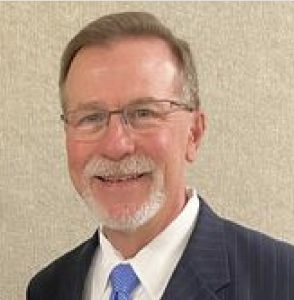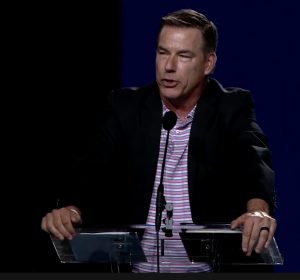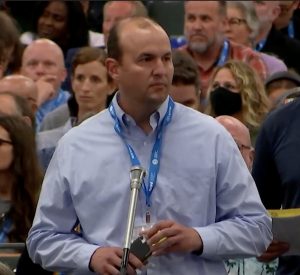Dr. Mark Coppenger Addresses the Southern Baptist Convention
[W]hen you make feelings the gold standard of reality, there is no limit to what can be said without fear of rebuke.
—Mark Coppenger—
Key point: It is no coincidence that as the SBC has moved away from practicing biblical justice and toward practicing and advocating social justice and its tenets, including critical theory, it also has abandoned godly discernment.
You can access all the articles in this series here.
On Friday, June 24, 2022, Dr. Russell Fuller and Dr. Tom Rush appeared on Jon Harris’s podcast, Conversations That Matter. These three Christian spokesmen shared valuable insights as they discussed several events and circumstances surrounding the recent Southern Baptist Convention meeting in Anaheim, California on June 14-15, 2022.

At Word Foundations we have talked about some of these already. In part 1, we illustrated how the passage of the Sexual Abuse Task Force recommendations and Resolution 6 have the potential to bring about the convention’s demise. Suffice it to say that This is no way to run a convention of churches! Yet, this is where we are.

While sexual abuse is abhorrent and while abusers must be held accountable and survivors supported, when emotions run rampant and sound reasoning is in short supply, authentic justice is obscured and even eliminated. Adopting a politically correct approach to a problem blown out of proportion — and that’s exactly what has happened in the SBC with regard to sexual abuse — is a recipe for disaster. I invite you to take just over four minutes to listen to Dr. Tom Rush explain some of the key details of the disaster-in-the-making. You can go here to read a printed summary of his statements.
As you continue to read, keep this statement from Dr. Rush in mind: “It was all orchestrated from the platform to control…[and t]he way the platform made it sound…[was] If you voted against this, you hate women. You’re in favor of protecting sexual abusers.”
It was all orchestrated from the platform to control…[and t]he way the platform made it sound…[was] If you voted against this, you hate women. You’re in favor of protecting sexual abusers.
—Dr. Tom Rush—
You’re about to witness a vivid illustration of what Dr. Rush said.
Mark Coppenger Speaks
Mark Coppenger has been a Southern Baptist statesman — and by that I mean that he has served Southern Baptists in numerous capacities — for decades. You can learn more about him here. Suffice it to say at this point that Dr. Coppenger has been around the block and has wisdom cultivated and grown through experiences that are both wide and deep. Realizing that local church autonomy is a valuable asset that makes the SBC and its affiliated churches unique, he has worked diligently preserve it. Moreover, he studied the Guidepost report, its recommendations, and the recommendations of the Sexual Abuse Task Force (SATF). Dr. Coppenger fully understands their implications (go here and here), including how they threaten, not only 1) local church autonomy, but also 2) the very structure of the SBC itself. Each is dependent on the other.
With grave concern over the problems facing the convention and its churches but also with a deep familiarity with SBC polity (including the bedrock principle of autonomy), Dr. Coppenger addressed the convention in Anaheim. As a messenger from Redemption City Church in Franklin, Tennessee, where his son, Jedidiah, serves as pastor, Mark spoke against the task force’s recommendations.
Mark Coppenger Responds to SATF from Randy Starkey on Vimeo.
Ed Litton: Microphone 6A, someone to speak against the recommendation.
Mark Coppenger: This is Mark Coppenger from Redemption City Church in Franklin, Tennessee.
None of us is approving of sexual abuse. When we passed the bylaws back in the 90s, we were opposed to churches affirming homosexuality, and it was out there clearly on the record. Nobody, no church is affirming laxity or indifference as a church body.
I have the sense that this whole enterprise, which was stimulated by the Houston Chronicle, is a little bit like the 1619 Project [which contends] that our nation is stained, it’s massively troubled in so many ways, and the like.
If you look at the numbers — and of course, we do look at numbers; we talk about the number of Crossover conversions, and we talk about. the number of missionaries — when you look at the numbers, over that 20-year period that they talked about, there were 28 million different Southern Baptists. If you have the number convicted, or multiply by 5 or 10, you still have a very small percentage of [members of churches in] the Southern Baptist Convention who have been convicted or pressed [accused] in one way or the other.
Now you can say, Oh, well, this is just the tip of the iceberg, and your mind can soar, and the like; but it strikes me that the burden of proof is on those who say that we have a dreadful problem that needs to be met.
And by the way, the false dichotomy is there: If you love Jesus and you’re really serious about this then you’ll vote for this, and if not, then you just show you don’t care and you’re not willing to repent, and so forth. That’s kind of cheesy, I think. I mean, it strikes me that this is more important than to treat it that way.
We do have a mechanism. When it happens, in the church, then you act, and you turn to the civil authorities. To go up, up, up, to the SBC level is an assault, I think, on our polity. If a church down the road from us in Tennessee is callous or indifferent toward an incident [of sexual abuse], then I’m not quite sure why we should be contributing Cooperative Program funds to somehow deal with their problem.
It just seems to me, and, by the way the report, I thought, was very badly framed. I think it’s a shame that we’ve gone out to secular people to solve our problems — so, yes, it’s a terrible thing. I said in writing I think some of these people should be shot. You know, it’s very serious.
But we’ve got churches, and we’ve got the police, and to do a superstructure with big funding, I think is a terrible mistake. I’m against the motion.
Bruce Frank Responds to Mark Coppenger
Task force chairman Bruce Frank responded to Dr. Coppenger.
Ed Litton: Mr. chairman, would you like to speak to that?
Bruce Frank: Yeah, I’d love, I’d actually love to speak to that. Mark — I appreciate, I do appreciate your thoughts. And I appreciate your sharing that. And I guess, there was a number of things there.

The most conservative statistics, to simply say that, simply say the people who are convicted are the only ones that are abusing people is unrealistic. Whatever study you look at, the most conservative, or the most liberal, or whatever study you look at, it usually is about three percent of abusers are actually convicted. So when you act… if that is your only safeguard, if your only safeguard is we’re only going to just do a Google search, or we’re only going to the civil authorities, we are opening the door for people to hurt our people. That’s not, that’s not some number we dreamed up, so if you take, let’s just say you take the 400 that, take the 400 that were on the internal list. If you just take a small percentage — take five percent, take ten percent. My math is not super great. When was a finance major at Texas Tech, so I make a lot of mistakes when it comes to math. But if you multi… if you say that’s only three percent — if that’s only three percent. That’s only three percent of — 400’s only catching that — then it is the tip of the iceberg. It doesn’t matter what you do.
And I would say, secondly, and I thought about this, because it’s normal to say, Why should I pay for someone else’s sin? Two thoughts about that:
Number one, first year, which is predominance, you would assume, setting up the database, those things have some upfront costs. But with those upfront costs there are no Cooperative Program dollars being used. Alright? It’s SEND Relief money, so there aren’t Cooperative Program dollars being used.
Secondly, there’s not a person in here that is Southern Baptist that has not benefitted from being a Southern Baptist. I went to a Southern Baptist seminary at a greatly discounted rate. I was able to be trained by associations that were Southern Baptist. I was able to then be a part of the largest missionary force in the world because I was Southern Baptist, even when the church I was doing had a hundred people — we couldn’t afford a missionary. And so, for us to then take all the benefits of the Southern Baptist Convention, and then when something is wrong step back and say, I don’t want to actually help redo the structure of the Southern Baptist Convention — does not fly.
—applause from messengers—
Takeaways from this Exchange
At least four themes arise from this exchange, and each one serves to unmask an aspect of the corrupt leadership of Southern Baptist Convention elites. Each link will take you to a page where you’ll be able to read in context the statements you’ll hear in the audio clips. If the SBC doesn’t change direction, and soon, it will cease to be a convention of independent, autonomous churches.
First, Mark Coppenger accurately describes the orchestrated climate of the debate.
This series of clips contains only statements from Dr. Coppenger, and none from Dr. Frank; what you’ll hear (and have heard) from Dr. Frank will substantiate Dr. Coppenger’s observations. The debate has been rigged because assumptions of systemic sexual abuse in the SBC were made and reinforced, and because the debate has been infused with emotional steroids rather than anchored to a solid foundation.
Dr. Coppenger is right to point to The 1619 Project as a fitting analogy. This curriculum rewrites American history by contending “that the real beginning of America came when a slave ship landed in Virginia a year before the Pilgrims landed at Plymouth Rock and over a century before the Declaration of Independence.” According to The 1619 Project and its author, Nikole Hannah-Jones, writes Coppenger,
the story of America is the story of slavery, as it’s worked itself out in a range of color-coded injustices and indignities. Of course, a lot of sorry stuff has occurred in that connection, but responsible historians have debunked her tendentious metanarrative. Likewise, I found the Guidepost work implausible and contemptible.
Yet, if one starts with the assumption that sexual abuse is systemic and widespread among Southern Baptists and a narrative already has arisen to support it, interested parties are in danger of
-
-
- continuing to operate with this assumption and
- holding onto it regardless of the evidence.
-
It’s like a man named Dexter, who was very much alive but was convinced he was dead. When his psychiatrist asked him if dead men bleed, Dexter said no. The doctor promptly stuck hs finger with a needle, causing blood to come forth. “Wow!” said Dexter. “Dead men really do bleed, after all!”
We should be aware that assumptions have not been limited to the theme of the presence of sexual abuse as a problem among Southern Baptists, but also have spread like a virus and mutated into numerous variants. One of the variants assumes, as Tom Rush noted and as Mark Coppenger concurred, that
-
-
- Southern Baptists have to do something. They must take visible and tangible action to address sexual abuse and that
- If you voted against this, you hate women. You’re in favor of protecting sexual abusers.
-
All of this raises numerous nagging questions. Here are several that appear at “the top of the list”:
-
-
- Why did the convention outsource the investigation to a company who holds a secular view of sexuality? According to Bruce Frank, “The issue is not what Guidepost thinks about LGBQ– the issue is what do Southern Baptists think of sexual abuse that is the issue.”
- Why is working with local law enforcement authorities, who have experience and expertise dealing with criminal behavior, including sexual abuse, not considered sufficient?
- Why must the Nashville-based SBC, which has no substantive experience or expertise in dealing with abuse, develop an investigative and reporting apparatus, and thereby potentially incur responsibility and liability itself for what is occurring in local churches many miles away? Why must Southern Baptists erect, in Mark Coppenger’s words, a “superstructure, with big funding”?
-
Is the answer to all these questions no more substantive than the notion that We have to do something?
Second, speculations are being portrayed as facts.
Listening to this series of clips, you’ll hear Dr. Coppenger cite numbers in the report to underscore the reality that “If you have the number convicted, or multiply by 5 or 10, you still have a very small percentage of [members of churches in] the Southern Baptist Convention who have been convicted or pressed [accused] in one way or the other.” Then he warns, “Now you can say, Oh, well, this is just the tip of the iceberg, and your mind can soar, and the like; but it strikes me that the burden of proof is on those who say that we have a dreadful problem that needs to be met.”
After hearing Dr. Coppenger, you’ll hear Bruce Frank do exactly what Dr. Coppenger warned against.
After hearing Dr. Coppenger, you’ll next hear Bruce Frank do exactly what Dr. Coppenger warns against. Frank speculates and allows his mind to soar — and he leads convention messengers’ minds to soar with his. Please listen with discerning ears to what Dr. Frank says, and carefully sort out speculation from actual findings in the report. It is difficult to even follow the mathematical “arguments” that Frank makes, but it is easy to see that a great deal of speculation is involved.

Frank says, “Whatever study you look at, the most conservative, or the most liberal, or whatever study you look at, it usually is about three percent of abusers are actually convicted.” He later adds, “That’s not, that’s not some number we dreamed up” — but actually, it is. Frank’s conclusions about sexual abuse in the SBC are tied to studies that were not SBC-specific.
Now, some may say, Well, we would expect abuse to be hidden and not reported among SBC churches, so it makes perfect sense to apply these studies to Southern Baptists. That’s speculation too! In part 1 we cited observations about the Guidepost report from demographer Lyman Stone of the Institute for Family Studies; we point to them again here. “Statistically speaking,” says Stone, “there were not that many cases. This is not actually that common of a problem in this church body.”

Thus, the SBC-specific research that has been conducted uncovered far fewer sexual abuse cases among Southern Baptists than was suspected. Assumptions often mislead. This is why an investigation was conducted in the first place! If sexual abuse really were widespread and systemic among Southern Baptists, the Guidepost report would have uncovered many more cases than two!
To help readers understand just how egregious Dr. Frank’s assumptions and conclusions are, Kyle Whitt has listened to his comments carefully and has crunched the numbers. You can read Kyle’s analysis here.
The burden of proof is on those who say we have a dreadful problem that needs to be met.
—Dr. Mark Coppenger—
Here’s the thing. When you’re talking about sexual abuse, whether from the perspective of an alleged abuser or a possible victim, facts are vital. They are paramount! Mark Coppenger is absolutely correct that “the burden of proof is on those who say we have a dreadful problem that needs to be met.” Along these lines, Southern Baptists will do well to heed a warning Dr. Coppenger published in a recent article. He writes,

Guidepost spins out numbers and anecdotes to argue their case that we must retool to insure that that [the Southern Baptist Convention and its churches are totally abuse-free], but I’d suggest they stumble by not asking the elephant-in-the-room question, “Out of 28 million members [2000-2020] and 47,000 churches, why so few manifest cases?” Quite probably they’d answer, “Because the victims, oppressed by shame, patriarchal high-handedness, etc., are reluctant to come forward. It’s a holocaust of abuse, with emotional fevers teeming just below the surface.” Well, then prove it. And if you don’t, you flirt with slander.
Out of 28 million members [2000-2020] and 47,000 churches, why so few manifest cases? This is the elephant-in-the-room question.
—Mark Coppenger—
Third, Southern Baptist Convention elites are shaming those who disagree with them and would dare to push back against the prevailing narrative, which the elites also have set.
This series of clips first features Dr. Coppenger’s observation (heard previously, in the second clip) that if you multiply the number of abusers convicted by five or ten, you still have a very small number of abusers, especially in light of the large number of Southern Baptists, to deal with. We’ll get to that comment momentarily and show how it relates to the tactic of shaming.
“We do have a mechanism,” contends Coppenger. “When it happens, in the church, then you act, and you turn to the civil authorities.” Dr. Coppenger is right. Although names have been changed, here is an actual conversation that took place on Facebook on June 23:
Ed: I wish America had a system for dealing with alleged crimes and sorting out the guilty from the innocent. If such a system existed, we could let them take care of injustice while we preached the gospel and made disciples of all nations.
Ted: Maybe it could even have a “hotline” you could call, with a simple and memorable phone number, I don’t know, like 911.
Fred: Ed, now, that is a great idea.
Jed: Ed, if America did have such a system, then maybe the SBC wouldn’t have to set up its own database of “credibly accused” alleged abusers (and thereby potentially incur liability) but could rely on databases already created and maintained.
Dr. Coppenger adds, “To go up, up, up, to the SBC level is an assault, I think, on our polity.” Of all men, Dr. Coppenger would understand this, and Southern Baptists are foolish if they don’t listen to and heed what he says. The “solutions” proposed to address the problem of sexual abuse will fundamentally change the SBC and its cooperating network of churches. The cases of sexual abuse that now are being used to compel the SBC to change its polity aren’t the first cases Mark has seen with that strong potential.

When I worked for the SBC EC in the early 1990s, I watched our attorney Jim Guenther defend Cooperative Program Mission funds from attorneys looking for deep pockets over two tragedies in Missouri. One concerned injuries to a student who fell off a hayride wagon at a state Baptist college; the other stemmed from the death of a child left asleep in the back of a church van on a sunny day. He was right and stewardly to argue that the SBC has no control over such hayrides and van mishaps. Furthermore, the college wasn’t endorsing hayride disasters or the church sanctioning fatal negligence toward children. Yes, he was protecting the SBC from financial liability. (As several attorneys have observed, “What in the world do you think attorneys do?”) But it wasn’t for selfish motives. And it wasn’t on bogus grounds.
Note what Bruce Frank says, in part, in his response: “[T]o simply say that, simply say the people who are convicted are the only ones that are abusing people, is unrealistic.” Dr. Coppenger did not “simply say” that “the people who are convicted are the only ones that are abusing people.” He said,
[W]hen you look at the numbers, over that 20-year period that they talked about, there were 28 million different Southern Baptists. If you have the number convicted, or multiply by 5 or 10, you still have a very small percentage of [members of churches in] the Southern Baptist Convention who have been convicted or pressed [accused] in one way or the other.
To misrepresent him in this way is both deceptive and insulting. It is shaming a messenger raising legitimate concerns.
But that wasn’t the only instance of shaming. Dr. Frank also implied that the recommendations of the task force were the “be-all-end-all” solution to the problem of abuse when he said, “[I]f your only safeguard is we’re only going to just do a Google search, or we’re only going to the civil authorities, we are opening the door for people to hurt our people.” The underlying message was clear, and the situation is exactly as Dr. Tom Rush said. The unspoken but unmistakable message from SBC elites was, “If you [vote] against this, you hate women. You’re in favor of protecting sexual abusers.”
I return to ask questions I emphasized earlier: Why is working with local law enforcement authorities, who have experience and expertise in areas of criminal behavior, including sexual abuse, not considered sufficient? Also, why will it help for the SBC, an entity that has no experience or expertise in matters of sexual abuse, to step in and effectively ruin local church autonomy in the process?
There are no reasonable answers to these questions, with exception of one. It actually isn’t all that reasonable, but it makes sense in light of the actions and perspectives of our elite leaders. Maybe all of this really is about virtue signaling and bowing down to the expectations of the Me Too movement!
Fourth, Southern Baptist Convention elites are becoming experts at coercion!
Dr. Coppenger raises an excellent point here. Imagine you’re a part of a church that never has seen an instance of sexual abuse, or part of one led by a pastor who has handled a difficult situation well. If the Cooperative Program effectively becomes a fund for awarding damages to those winning and/or settling lawsuits, why should your church continue to give to it?
Bruce Frank says all Southern Baptists have enjoyed certain benefits because they have been Southern Baptists — and that to enjoy these benefits and then “when something is wrong step back and say, I don’t want to actually help redo the structure of the Southern Baptist Convention — does not fly.”
Dr. Frank needs to realize that the “something wrong” primarily is someone’s sin, not a difficulty for which no one ultimately is culpable, such as a natural disaster or an accident. This represents an abandonment of biblical justice if there ever were one! Bruce Frank also needs to realize, but won’t, that the “something wrong” includes turning a missions fund into a money pot that crooked lawyers and other nefarious players are effectively being invited to raid. Further, the “something wrong” includes robbing churches of their autonomy by creating a top-heavy, bureaucratic entity that doesn’t know what it’s doing but at least will be acting to help the elites feel good — because, at last, we did something!
Casting his arguments as he did, Bruce Frank is being overtly coercive: If you don’t go along with this (which amounts to supporting sin and inept leadership with your money), you’re not doing your part! You are a selfish leach, one who is willing to take but unwilling to sacrifice.
Missing the Point Completely
I close with this. Another messenger, Tim Overton, pastor of Kingston Avenue Baptist Church in Anderson, Indiana, rose to object to the SBC’s moving ahead based on information about sexual abuse gathered by a company it hired, Guidepost Solutions, that supports LGBTQ+ ideology.
Guidepost is committed to strengthening diversity, equity and inclusion and strives to be an organization where our team can bring their authentic selves to work.
We celebrate our collective progress toward equality for all and are proud to be an ally to our LGBTQ+ community. pic.twitter.com/i6DKiX36nm
— Guidepost Solutions (@GuidepostGlobal) June 6, 2022

Tim made a point that ought to resonate with every godly Southern Baptist. He said,
As all of you are aware, roughly less than a week ago, Guidepost came out celebrating gay pride. I have a big problem with their influence upon the task force recommendations. I know they can say that that doesn’t affect things, but we gave them a lot of money. And my concern is 1 Corinthians, chapter 6, where Paul says why are you going before the unrighteous to settle disputes among you?…I believe Guidepost has polluted this report, and my advice is to vote this down, pick it up next year, and handle it biblically. We can either do it Paul’s way — the Bible’s way — or the platform’s way. You can’t do it both.…What I want the task force to answer, and others who are for this to answer is How do you square this with 1 Corinthians chapter 6?”
Please listen to the entire audio clip. Immediately after Pastor Overton requested an answer to his question, How do you square this with 1 Corinthians 6?, no effort was made by Ed Litton, president of the convention, or Bruce Frank, or anyone on the task force, to answer it. And the question was called. And the vote was taken. And the recommendation was approved. Rev. Overton deserved an answer, but he was ignored.
Whether he made his statement before or after Tim Overton spoke, Bruce Frank stated clearly what his position is. According to Frank, “The issue is not what Guidepost thinks about LGBQ– the issue is what do Southern Baptists think of sexual abuse that is the issue.” Leaders who act this way are not fit to lead the Southern Baptist Convention.
Our president @bartbarber ladies and gentlemen. #SBC22 @bellevuepastor pic.twitter.com/9k7cCoxeBA
— Grant Gaines (@DGrantGaines) June 17, 2022
This includes our newly elected president, Bart Barber, and pastors Steve and Grant Gaines, who are father and son. Is there no fear of God or respect for the things of God left among those who hold leadership positions in the SBC? They and other like-minded elites effectively malign or ignore those who fear God, think for themselves, and ask legitimate questions; and, lest these folks get out of hand, they misrepresent them. Just ask Mark Coppenger.
As we have seen, there’s more. These “leaders” prey on people who have the best of intentions; and sadly, SBC leaders have become masters of this kind of manipulation.
Is there hope for the SBC? Can it return to biblical fidelity? Can its integrity be restored? The irony is that a the corruption in the SBC is being revealed even in and through its attempt to deal with sexual abuse. But one has to observe what is happening and listen to what is being said with discerning eyes and ears.
If there is hope for the SBC, SBC pastors by the hundreds are going to have to join ranks with Mark Coppenger and Tim Overton. They’re going to have to inform their people about the problems that exist “beneath the radar.”
In short, they’re going to have to engage, and they’re going to have to speak prophetically.
I don’t see any other way out.
Copyright © 2022 by B. Nathaniel Sullivan. All rights reserved.
Unless otherwise indicated, Scripture has been taken from the New King James Version®. Copyright © 1982 by Thomas Nelson, Inc. Used by permission. All rights reserved.
top image credit: Photo by Piron Guillaume on Unsplash


Be First to Comment